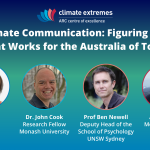 September 1, 2021 12:24 pm
Published by Climate Extremes
September 1, 2021 12:24 pm
Published by Climate Extremes
Climate Australia host Lee Constable is joined by the chief investigators in the Drought team of the ARC Centre of Excellence for Climate Extremes – Prof Nerilie Abram, Prof Jason Evans and Dr Andrea Taschetto. Along the way, Lee discovers why drought is such a tricky topic to explore for climate scientists and why understanding how droughts may change in the future is one of the wicked problems of climate change.
 September 1, 2021 12:13 pm
Published by Climate Extremes
September 1, 2021 12:13 pm
Published by Climate Extremes
Climate Australia host Lee Constable is joined by CLEX Media and Communications Manager Alvin Stone; Research Fellow at Monash University and founder of Skeptical Science Dr John Cook; and Deputy Head of the UNSW School of Psychology Prof Ben Newell to explore the current research around communicating climate science
 August 26, 2021 3:02 pm
Published by Climate Extremes
August 26, 2021 3:02 pm
Published by Climate Extremes
Our new media strategy following our mid-term review, which aims to reach out to stakeholders beyond academia, is already bearing fruit. And this new focus received a real boost with the release of the IPCC Working Group 1 report.
 August 26, 2021 10:36 am
Published by Climate Extremes
August 26, 2021 10:36 am
Published by Climate Extremes
The past four months have seen our engagement with policymakers and industry accelerate. CLEX has been extremely active in briefing Federal and State policymakers, businesses and other stakeholders on the new IPCC report, growing our impact and influence well beyond academia.
 August 26, 2021 10:23 am
Published by Climate Extremes
August 26, 2021 10:23 am
Published by Climate Extremes
At the time of writing, four of our five nodes are in lockdown. In the meantime, we have refreshed the researcher development program, postponed our winter school (again) but still created a range of engaging sessions and workshops for students and ECRs.
 August 25, 2021 3:37 pm
Published by Climate Extremes
August 25, 2021 3:37 pm
Published by Climate Extremes
The Paris Agreement requires countries to commit to reducing their greenhouse gas emissions to ensure that the global average temperature remains well below 2°C above pre-industrial levels and to pursue efforts to limit the temperature increase to 1.5°C. But how likely are we to meet these targets?
 August 23, 2021 11:35 am
Published by Jenny Rislund
August 23, 2021 11:35 am
Published by Jenny Rislund
Hydrological impact studies analyse the effects of climate change on hydrological variables, such as changes in soil moisture, streamflow or hydrological extremes. This project aims to investigate the realised added value effect of model bias correction and downscaling methods on hydrological projections for Australia.
 August 19, 2021 4:22 pm
Published by Climate Extremes
August 19, 2021 4:22 pm
Published by Climate Extremes
A three-year position is available in CMS after Annette Hirsch accepted a position with Deloitte. Meanwhile, CMS released a new version of CABLE-WRF, developed a data and code collection, redesigned training sources on the CMS wiki, and have helped create access to new configurations in ACCESS-ESM1.5.
 August 18, 2021 12:06 pm
Published by Jenny Rislund
August 18, 2021 12:06 pm
Published by Jenny Rislund
In Melbourne, 50% of rainfall and 75% of extreme daily rainfall occurs on days with at least one linearly organized convective system. However, thunderstorms are often localized events, and much of the rainfall in a region falls over a short period of time. Furthermore, not all thunderstorms necessarily occur in lines, and organized storms that lead to extreme sub-daily rainfall may be different from those that lead to extreme daily rainfall. This projects aims to identify and categorize organizational structures linked with the most intense rainfalls in the region.
 August 18, 2021 11:48 am
Published by Jenny Rislund
August 18, 2021 11:48 am
Published by Jenny Rislund
In 1891, Melbourne experienced one of its worst floods on record leading to extensive damage and many deaths. But what was this wayward weather system? How often do lows from our east coast drift westward, and what are their impacts in Victoria? How many of our most significant flooding events are associated with a pattern like this? And are these systems changing over time?










